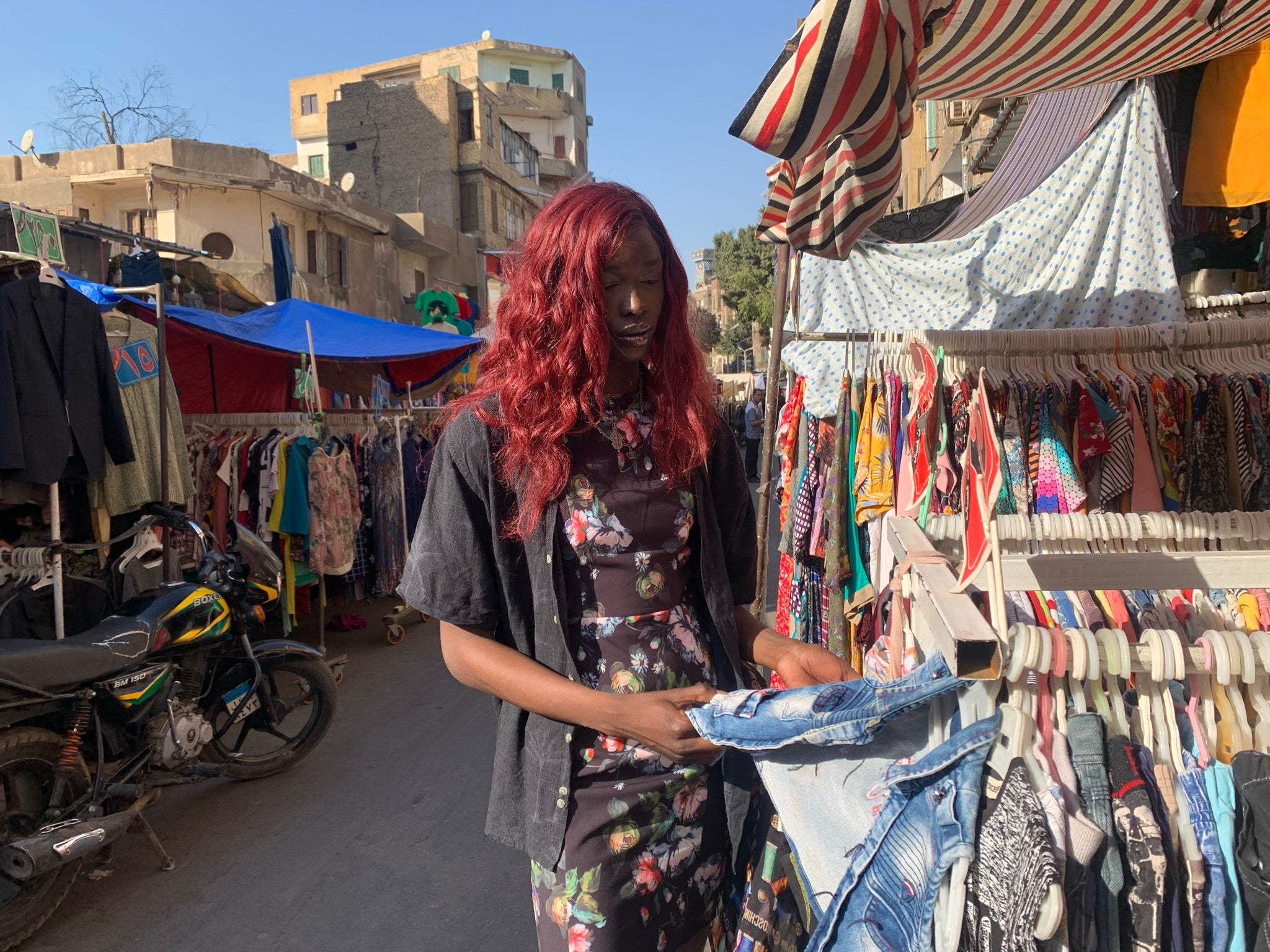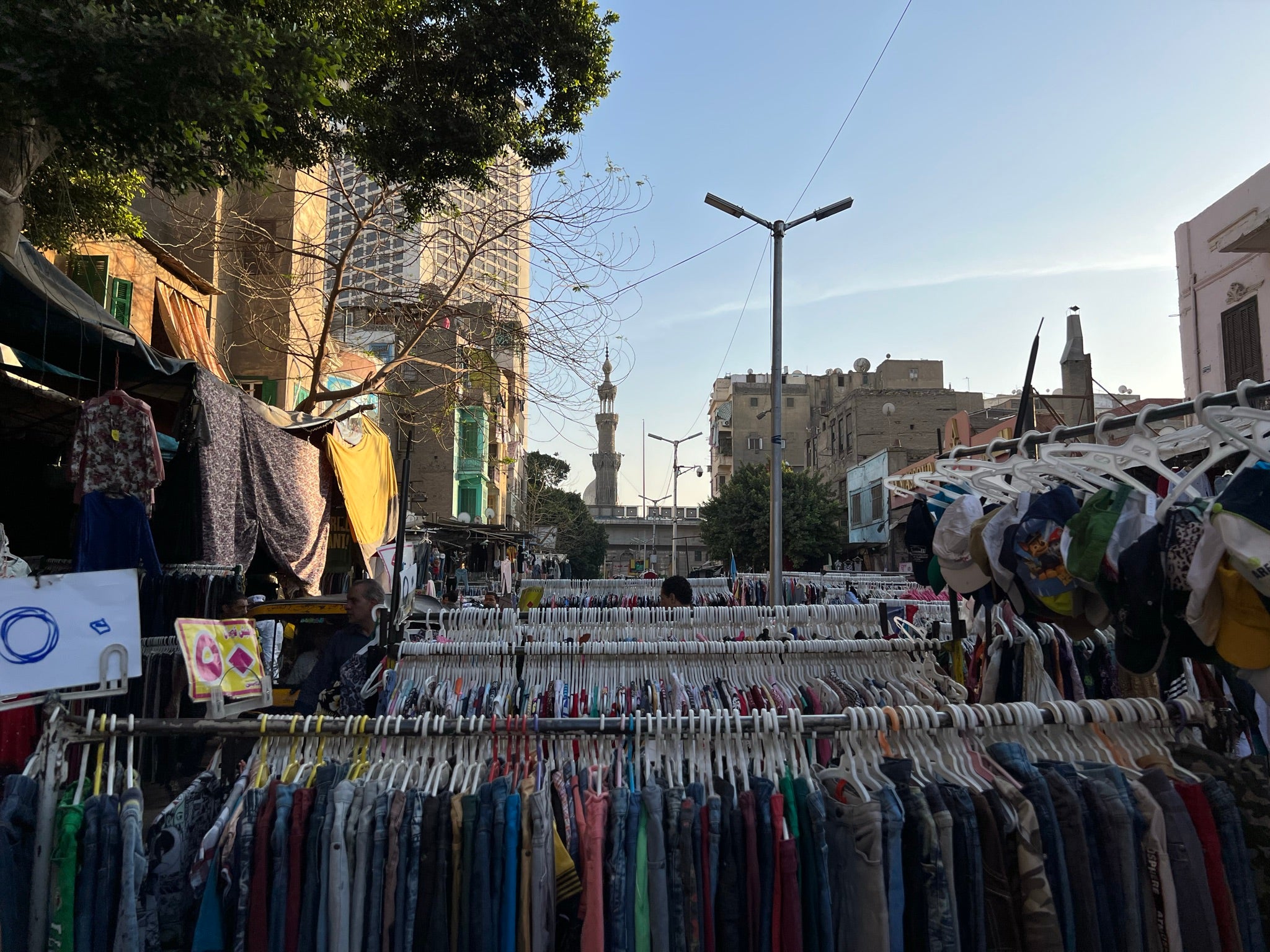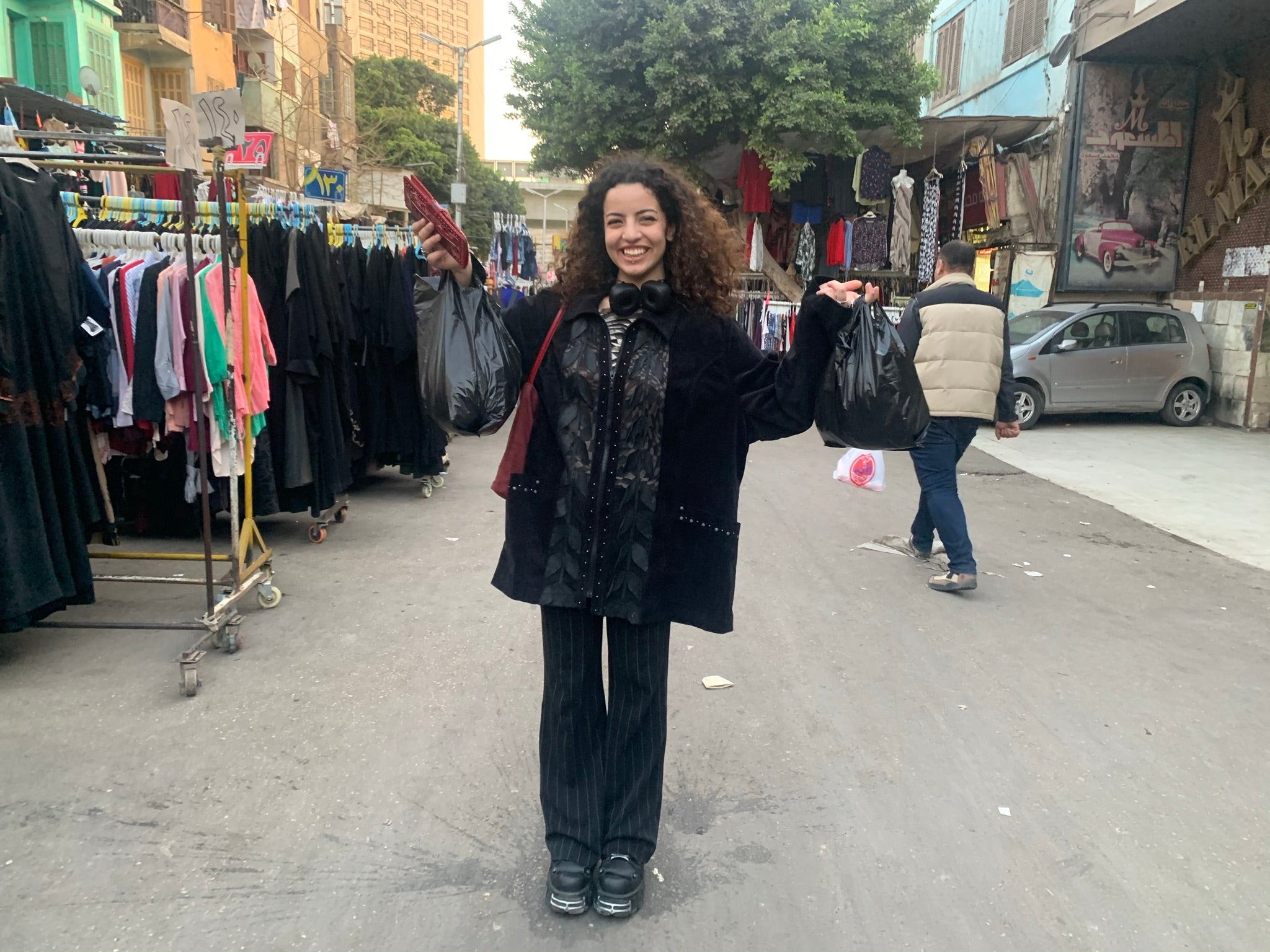The Cairo market which attracts Egypt’s Gen Z hipsters
Wekala is a popular second-hand shopping district in central Cairo, and a cultural heartbeat of the city, reports Edgar Mannheimer from Egypt

Between endless rows of white hangers stretching far as the eye can see, 25-year-old Henny sifts and thrifts through second hand Versace, NRA T-shirts, corduroy trousers and endless multi-coloured houndstooth blazers.
“Sometimes I’ll buy a baby T-shirt and use it as a crop-top,” she whispers as a tuk-tuk swishes by, honking its horn at shoppers to make way. Tuk-tuks are the only motorised vehicles that will fit on the small slab of concrete still visible from what used to be a two-way avenue.
This is the main strip of Wekala, Cairo’s popular second-hand shopping district. Located in one of the city’s oldest working-class neighbourhoods, Boulaq, it is a place that came into existence in the 1970s through the power of political culture and social change.
“Wekala to me is amazing. It’s the number one spot for clothes and accessories,” says Zeina Soliman, a 19-year-old artist and creative.
“I stopped supporting fast fashion a couple of years ago and I find it difficult to see my style in brand name shopping malls. But in Wekala if I look hard enough I know I will find something, and even if it’s not exactly perfect I know I can work with it and create something great.
“Not to mention the sellers that, over time, you get to know. A bunch of them apparently follow my Instagram page, which is full of the clothes I buy from Wekala,” she says, laughing.
One such seller is 24-year-old Zyad ElNa7as, an Egyptian trap musician who grew up in the neighbourhood. “I was born in Boulaq, right over there, raised in a dumpster. Look at these houses man, they’re beautiful. I shoot all my music videos here because there’s no place like it − the location itself inspires me and gives me new ideas,” he said while pointing at the old three-story apartment buildings in shining turquoise.
Wekala has looked the same for as long as Zyad and Henny have been alive. But the area has been at the centre of Egyptian trade and manufacturing for centuries. Wekala literally means “agency” and in the past, Boulaq hosted marketplaces for lumber, spices and dates.

“Boulaq is where the French, in the late 1700s, set up Egypt’s first printhouse. It’s the home of Egypt’s first railway station, electricity station, water station, and newspaper and magazines,” says Atef Awad, sitting deep inside one of his two shops on the main strip − away from the tumult outside.
The neighbourhood used to be an industrial zone, known for lumber and steel. Boulaq was Cairo’s main harbour, naturally turning it into a place of trade. In the 1960s, shortly after Egypt’s monarchy was toppled, the country’s charismatic and ruthless leader Gamal Abdel Nasser commissioned the construction of the Maspero television building − which still houses the oldest state-run broadcasting organisation in the Middle East and Africa − and towers above the Boulaq neighbourhood.
After Egypt’s humiliating defeat in the 1967 Arab-Israeli war, the Arab-Socialist project came to a halt. Abdel Nasser’s successor, Anwar Sadat, made peace with Israel and opened up the country to foreign investment.
“All the workshops started shutting down, turning the neighbourhood into a marketplace for metal scraps, war machinery scraps, any kind of scraps really. The second-hand clothing market started in the late 1970s during Sadat. In the beginning, clothes were used for stuffing – they were not worn. When poverty rates began shooting up under [Sadat’s successor, Hosni] Mubarak, Wekala became the go-to for the poor,” says Mr Awad.
When you find something at Wekala - or when that something finds you - that feeling is priceless
“Trade is much easier than manufacturing. Today, in order to manufacture any product with proper quality, it will cost you a lot. But this business comes all the way from Europe almost for free. The entire cost for sorting it out, packing and shipping it is cheap. This is essentially the recycling business. But we don’t recycle second-hand clothing, we sell it as it is. Fashion has driven many young people to demand it,” he adds.
Omneya Gad, 54, runs a clothing warehouse that services some of Cairo’s leading designers and stylists. She bought her first pair of jeans at Wekala in the Nineties and shops there several times a week. “In the past, sellers would dump any kind of clothes in front of the stores, without aesthetic forethought. But now they know what is in demand, and place vintage clothes - old, iconic pieces from Europe – at the storefront,” she said.
“When I walk down the strip sellers will size me up and adjust their suggestions accordingly - if I’m wearing baggy clothes that’s what they’ll show me,” says Omneya’s business partner, the reputable designer and stylist Ahmed Sorour.
Just across the Nile, facing the Boulaq neighbourhood, lies the posh island of Zamalek, housing many of the young creatives who shop at Wekala.

Vintage shopping is as popular in Cairo as anywhere, and for those who dare not venture into the hectic market − where you’re at risk of being hit by a tuk-tuk or being catcalled by sellers and shoppers − Instagram pages exist which sell pieces found at Wekala for double or triple the price.
Henny, however, remains unphased. “Clothes are political. Wekala is a shock to the classist hierarchies within the fashion industry. The fact that I can find a Givenchy jacket for 70 Egyptian pounds (less than £3) is a beautiful thing. But it is a dilemma for me. Shopping at a place that essentially services the poor is problematic, but then again it’s better than buying clothes from brands like Zara and H&M that mistreat its workers who labour under slave-like conditions in south Asia.”
Despite it being the middle of Ramadan, Wekala is as busy as always. As late afternoon approaches and the temperature drops, fasting shopkeepers start preparing for Iftar and the mood lightens. Monir Nasr, 23, has just found a pink button-down shirt with see-through details on the collar and is frolicking through the rows of hangers, cracking jokes and taking pictures with sellers. “When you find something at Wekala − or when that something finds you − that feeling is priceless,” they say.






Join our commenting forum
Join thought-provoking conversations, follow other Independent readers and see their replies
Comments